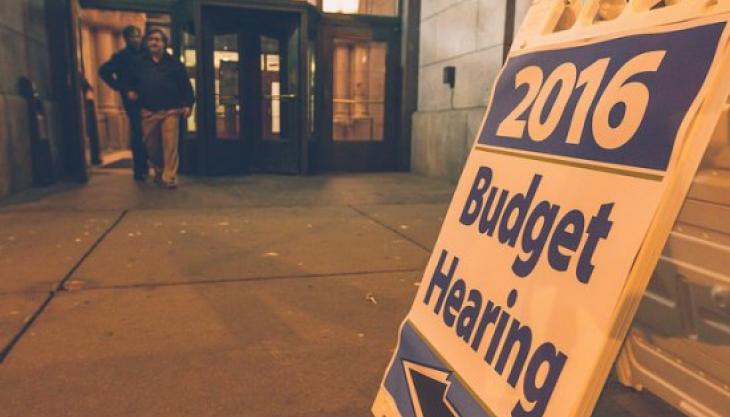Government Changes Means Your Security Clearance May Be at Risk - Don’t Let Bad Credit Cost Your Job
Submitted by Rachel R on Wed, 01/13/2016 - 9:37am

2016 Government budget changed security clearance standards - are you at risk?
Image Source: Flickr User Tony Webster
The 2016 budget recently approved by Congress came with a caveat that agencies with personnel that possess security clearances must be screened more often and more aggressively. Credit problems can result in your security clearance being downgraded or pulled – and if your job requires a clearance, you can lose it.
Why credit scores matter for a security clearance
Lt Colonel James Gregory of the Pentagon says a reason for concern is, “a person with big debts is more likely to accept money in exchange for revealing secrets… that’s why financial things are one of the biggest reasons that a clearance would not be granted or revoked.” Credit scores have always been part of the check, but now the review will be more intense and more frequent.
What’s changed with security clearance checks
The new budget legislation requires background on people with a security clearance to be reinvestigated twice every five years. And checks must include “relevant and appropriate information from various sources, including government, publicly available, and commercial data sources, consumer reporting agencies, social media, and such other sources as determined by the Director of National Intelligence.”
This means not only do you need to be mindful of your accumulation of debt, and how you pay that debt, but also how you conduct yourself on social media. If you mention your money woes or anything your government bosses might find troublesome on Facebook or Twitter – or pics of any of these on Instagram, you might end up with your clearance lowered or revoked – and that means you could be ousted from the military or your civilian job that requires the clearance.
How to deal with overwhelming debt and protect your clearance
Not only can being delinquent on debt be a red flag that could damage your security clearance – but being in too much debt – even if you’re paying on time can also be a problem. If your credit cards are maxed out and you’re living paycheck to paycheck yet still scraping by, you may think you’re okay, and things will work out. However, your debt-to-income ratio can put your clearance at risk.
Chapter 7 bankruptcy results in a discharge of many unsecured debts including credit cards, medical bills and some delinquent taxes. This can give you a clean slate, reduce your debt-to-income ratio and allow you to get your finances under control and protect your clearance. And if you’re behind on your obligations, Chapter 7 can give you a reset that can protect your job.
Chapter 13 bankruptcy may be preferable if you are behind on your mortgage or auto loan. If you have equity in your home that’s worth protecting, you can catch up on back payments through an installment plan. You may also be able to shed a second mortgage that’s not supported by equity. If you owe more than your car is worth, you may be able to have the principal and/or interest rate lowered to fair market settings that can decrease payments.
Bankruptcy can be a solution for debt-related security worries
While too much debt or past-due debt is a red flag in a security clearance check or review, bankruptcy is not. In fact, it shows that you are addressing your debt issues and with your debt under control, you are likely a safer bet to keep your security clearance. If you’re concerned about your debt and your security clearance, talk to a reputable bankruptcy attorney before it’s too late.
Contact the Law Offices of John T. Orcutt for a free North Carolina bankruptcy attorney. Call +1-833-627-0115 now for a free appointment at one of our locations in Raleigh, Durham, Fayetteville, Wilson, Greensboro or Wilmington.
Resource:
Debts Hurt! Got debt? Need help? Get started below!
Serving All of North Carolina
- Bankruptcy Attorneys Raleigh NC (North)
- Bankruptcy Attorney Fayetteville NC
- Bankruptcy Attorney Durham NC
- Bankruptcy Attorneys Wilson NC
- Bankruptcy Attorneys Greensboro NC
- Bankruptcy Attorneys Southport NC
- Bankruptcy Attorneys Wilmington NC
Bankruptcy Attorneys Raleigh NC (North)
6616 Six Forks Rd #203 Raleigh, NC 27615 North Carolina
Tel: (919) 847-9750

Bankruptcy Attorney Fayetteville NC
2711 Breezewood Ave Fayetteville, NC 28303 North Carolina
Tel: (910) 323-2972

Bankruptcy Attorney Durham NC
1738 Hillandale Rd Suite D Durham, NC 27705 North Carolina
Tel: (919) 286-1695


Bankruptcy Attorneys Greensboro NC
2100 W Cornwallis Dr. STE O Greensboro, NC 27408 North Carolina
Tel: (336) 542-5993

Bankruptcy Attorneys Southport NC
116 N Howe St. Suite A Southport, NC 28461 North Carolina
Tel: (910) 218-8682

Bankruptcy Attorneys Wilmington NC
116 N. Howe Street, Suite A Southport, NC 28461 North Carolina
Tel: (910) 447-2987
